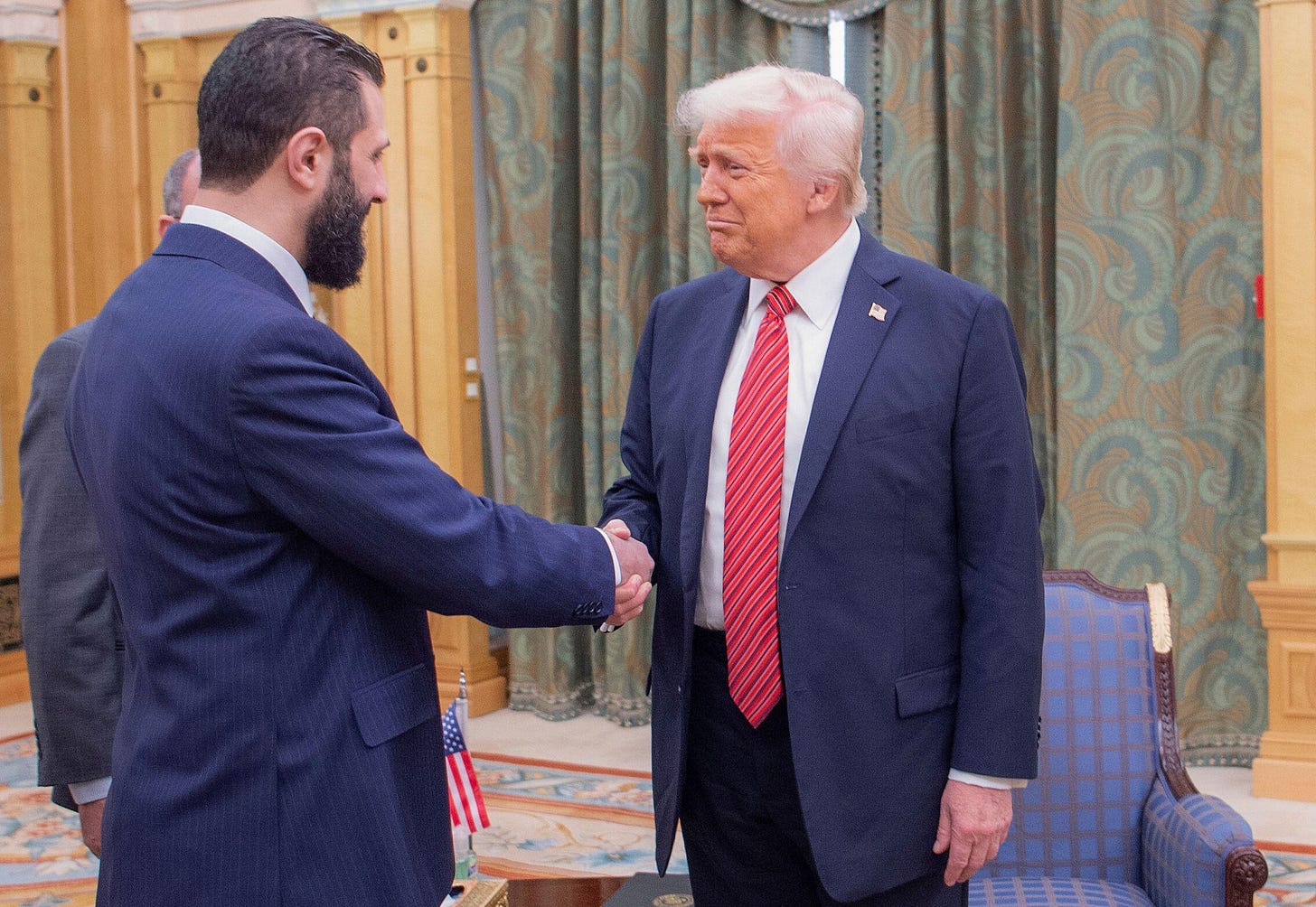Friends of the Syrian revolution?
The debate over sanctions has revealed who was consistently concerned with Syrian well being — and who saw the revolution as a way to keep the country burning.

Joel Rayburn, a political operator who I’ve reported on quite a few times, is the Trump administration’s nominee to be assistant secretary of state for Near Eastern affairs. At his confirmation hearing on Thursday, quite a few interesting statements about Syria were made. Sen. Jeanne Shaheen (D—N.H.) made perhaps the most interesting, as first reported by the Middle East Eye.
Shaheen: I have been concerned by some rumors that I have heard in some circles that have been repeated to me by people from the Middle East that they have heard in foreign policy circles of the administration that one options that's been suggested is assassinating the new leader of the Syrian government, Mr. Ahmad al-Sharaa. Can you just talk about what the implications of that kind of action would mean for Syria and for the region?
Rayburn: Senator, I'm not familiar with efforts like that but I think that's clearly not in line with the President's intention that he stated or his description of Mr. Sharaa in the past couple of days. I agree his meeting sounded like it was very positive and that that's good news.
Shaheen: I think one of the things that was pointed out to us by King Abdullah [of Jordan] was that a change in leadership of that kind would create an all-out civil war in Syria. That would not be good to take advantage of the opportunity we have to move that country forward.
Shaheen and two other Democratic senators pressed Rayburn on whether he would actually execute President Donald Trump’s order to fully lift economic sanctions on Syria. Without mentioning sanctions specifically, Sen. Rand Paul (R—Ky.) brought up Rayburn’s former boss, Amb. James Jeffrey, bragging about playing “shell games” to confuse the White House about the U.S. presence in Syria. On the other hand, Senate Foreign Relations Committee Chair Jim Risch (R—Idaho)1 implied that Trump’s announcement went further than Washington really wanted, and that it could be reversed.
Risch: Myself and this committee and Senator Shaheen were all instrumental in getting the Caesar sanctions2 put in place that we think were at least helpful in bringing [former Syrian ruler Bashar] Assad down and now we're under pressure to do the opposite of that and start removing them. We had actually written the President and asked him to relieve the sanctions and now he has done that a little more robustly than we made in mind. Nonetheless we're still in a wait and see, and those sanctions that were taken off, they can be put back on. We're going to continue to watch this. We really hope this works out. Syria's a proud country, long history. They have the ability to do this. Whether they can do it or not remains to be seen but in any event, your thoughts on where we're heading there?
Rayburn: Senator, thank you for raising this. I think the President is giving the Syrian people and the Syrian interim authorities a golden opportunity, a chance to rebuild after half a century under oppressive rule and especially the debilitating war that they went through, where the people suffered largely at the lands of the Assad regime and its Iranian and Russian and Hezbollah allies. He's giving them a chance to turn the page on that and chart a new course. He's also been very clear, as has Secretary [Marco] Rubio, that there are expectations as we move along the path, as the United States moves along the path of giving them this opportunity. The President has certain expectations. Secretary Rubio has laid out certain expectations that they're going to move and turn the page commensurately by a normalization agreement with Israel…
Some supporters of the Syrian revolution were displeased by what they heard in the hearing. The revelation that someone in the Trump administration was plotting to kill Sharaa needs no elaboration; as King Abdullah made clear, it would be a way to plunge Syria back into civil war just as the country is starting to recover. Of course, who exactly pushed that idea is still an interesting mystery. I have some guesses, but I don’t want to speculate wildly in public. If you know anything about it, you can always reach me anonymously and securely on Signal at matthewpetti.24:
Risch and Rayburn’s comments on sanctions also seemed, to New Lines Magazine editor in chief Hassan Hassan, a “way to shift & qualify Trump’s policy.” Syrian-American lawyer Hamdi Rifai accused the State Department bureaucracy of “actively working to block Congress from terminating the most severe sanctions against Syria.” Aaron Zelin, a senior fellow at the Washington Institute for Near East Policy, warned about the possibility that “certain people in the Trump administration are trying to slow implementation of [Trump’s] decision” to lift sanctions.
I’ve also heard down the grapevine that Syrian diaspora activists have felt a deep sense of betrayal, particularly from pro-Israel hawks. Though they were on the same side on question of whether to sanction Syria under Assad, they are now completely at odds. While Syrians of all stripes are looking for ways to reintegrate and rebuild the country, Israel immediately began looking for ways to undermine and partition the new Syria, including by opposing sanctions relief, because any sovereign and strong neighbor would be an obstacle to maximalist Israeli aims.
A distinct yet overlapping group with the pro-Israel lobby are the War on Terror dead-enders. Though they were happy to see one enemy destroy another, they see Assad (via his backers in Iran) and Sharaa (via his former comrades from Al Qaeda in Iraq) as two heads of the same Islamist hydra. White House counterterrorism director Sebastian Gorka is the most public figure pushing for an aggressive approach to the new Syria.
Rayburn also falls into this camp. The author of the U.S. Army’s official history of the Iraq War, he has quite an open desire for vengeance against anyone who frustrated the U.S. occupation there. As Middle East Institute expert Charles Lister points out, Rayburn’s think tank whined about Trump’s outreach to Sharaa in light of his “ongoing terrorist designation and his empowerment of jihadist factions.”3
Another irony is that doves in Washington, whom many supporters of the Syrian revolution identified as opponents due to their opposition to sanctioning Assad, are now among of the most friendly factions to the new Syria. My former employer, the Quincy Institute for Responsible Statecraft, immediately called for “official lines of communication with the new regime” and sanctions relief — with no preconditions — after Assad fell.
“Syria’s transition will almost certainly entail human rights violations,” the institute (correctly) predicted, but sanctions should remain “a last resort, given their negative impact on reconstruction and on positive policy formation in the new Syria.”
The opposition to sanctions under Assad and the opposition to sanctions under Sharaa come from the same principle: that this kind of economic pressure punishes ordinary people and poisons internal politics. Opposing additional sanctions on Syria in 2023, the Quincy Institute wrote that such “policies have failed to remove Assad from power, and there is no evidence that they will succeed in doing so now or in the foreseeable future.” That prediction turned out wrong, although for reasons that neither doves nor hawks could have foreseen.
I suspect that many hawks actually shared4 this view of the Syrian revolution as a tragic lost cause, which is exactly why they aligned with the revolutionaries on the questions of sanctions. In the name of keeping the hope of revolution alive, they could keep the country burning forever.
That’s not to say all hawks were this way. Zelin and Lister, who speak for hawkish establishment think tanks, have been consistent about supporting the transition against hostile outside pressure. Rep. Joe Wilson (R—S.C.), who had a red-faced temper tantrum about the New York Times honoring dead Palestinian children in 2021, has become a surprisingly vehement supporter of sanctions relief. Still, observers from across the political spectrum would have considered Sharaa taking power an unmitigated disaster just six months ago; no one predicted the government to collapse in a week, with “only” a few hundred casualties, followed by a rapid consolidation of power.
There are also some actual pro-Assad figures who opposed sanctions under Assad and support them under Sharaa. While most of these voices amount to farts in the wind, there is one exception: U.S. National Intelligence Director Tulsi Gabbard. Years ago, I covered her supposed humanitarian opposition to sanctions in Congress. Now, she’s reportedly aligned with Gorka on preventing engagement with the new Syria. I suspect that she represents a specific kind of War on Terror dead ender, whose hostility to Sunni Muslim causes led her to identify Assad as a sectarian lesser evil.
The reconstruction of Syria — and the Middle East writ large — will only be possible if the U.S. drops all of its vengeance-driven politics. In the same speech announcing the end of sanctions, Trump expressed excitement with the idea that “some of the closest friends of the United States of America are nations we fought wars against in generations past.” Rather than a liability, Sharaa’s past with Al Qaeda is an asset in Trump’s eyes, because it represents the possibility of turning enemies into friends.
The people encouraging this mentality now are the supposed “tankies” on the Left and “isolationists” on the Right. The old class of “Middle East hands,” with big plans for the region, has too many pent-up vendettas against those who would frustrate those plans.
Once described by a former editor of mine as “the most contemptible worm who ever lived.”
That puts Rayburn at odds with Jeffrey, his superior during the first Trump administration, who identified Sharaa very early on as a potential partner.
When it came to other countries such as Iran, the neoconservative Foundation for Defense of Democracies was quite open about its view that sanctions would cause a lot of violence and chaos without the clear hope for a political solution.



